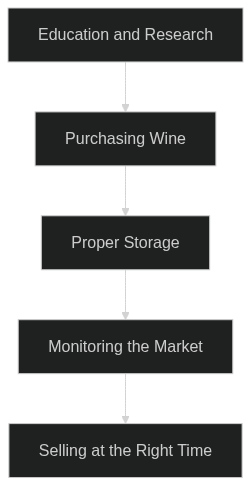I. Understanding the Wine Market
The Growing Popularity of Wine Investment
In the past few decades, wine investment has garnered considerable attention as an exciting and lucrative avenue for alternative investments. This surge in interest can be attributed to the impressive performance of fine wines in the market, as well as the expanding global appreciation for wines.
The Basics of the Wine Market
The wine market is unique in its dependence on several factors that do not affect traditional markets. These include the vintage, producer, and region of origin of the wines, as well as the condition and provenance of the bottles.
Wine as an Alternative Investment
As an alternative investment, wine offers a hedge against traditional market volatility. Fine wines have consistently demonstrated steady appreciation over time, and the demand for top-tier wines outstrips supply, further driving prices up.
II. Factors that Affect Wine Value
The Importance of Vintage
In wine investment, the vintage is of paramount importance. It refers to the year in which the grapes were harvested. Certain years yield superior quality grapes due to favorable weather conditions, leading to exceptional wines that appreciate significantly over time.
The Role of Producer
The reputation of the wine producer plays a significant role in determining the investment potential of a wine. Renowned producers like Château Lafite Rothschild, Domaine de la Romanée-Conti, and Screaming Eagle command premium prices in the market.
The Impact of Region
The wine’s region of origin also heavily influences its value. Certain regions, such as Bordeaux in France and Napa Valley in the United States, are famed for their quality wines and enjoy high demand from collectors and investors alike.
III. How to Start Investing in Wine
Getting Educated About Wine
Before diving into wine investment, it’s crucial to acquire a solid understanding of the wine market. This involves learning about different wine regions, vintages, producers, and wine varieties.
Buying Wine for Investment
Purchasing wine for investment purposes differs from buying wine for personal consumption. Investors should focus on acquiring fine wines from reputable merchants, auctions, or directly from vineyards. It’s advisable to diversify your wine portfolio to spread risk.
Storing Wine Properly
Proper storage is vital to maintain the condition of the wine, as it directly affects the wine’s value. Ideally, wines should be stored in a climate-controlled environment with optimal temperature and humidity levels.
IV. Risks and Rewards of Wine Investment
The Potential for High Returns
Fine wines have shown a remarkable ability to appreciate over time, offering impressive returns on investment. Some iconic wines have even been known to double or triple in value within a few years.
The Risks Involved
Like any investment, wine investment comes with its share of risks. These include the risk of counterfeit wines, the potential for damage during storage and transport, and the impact of global events on the wine market.
Mitigating Risks in Wine Investment
Investors can mitigate risks by purchasing from reliable sources, ensuring proper storage, insuring their wine collections, and staying informed about the market trends.
V. Case Studies in Wine Investment
Success Stories in the Wine Market
There are numerous success stories in the wine market, with investors reaping significant profits from their wine investments. For instance, those who invested in top Bordeaux wines in the early 2000s saw their investments multiply over the next decade.
Lessons from Failed Investments
Despite the potential for high returns, not all wine investments succeed. It’s important to learn from these experiences and understand that proper research and due diligence are key to successful wine investment.
VI. Future of Wine Investing
Trends Shaping the Wine Market
Several trends are shaping the future of the wine market. These include increasing demand from emerging markets, a shift towards sustainable and organic wines, and the growing importance of e-commerce in wine sales.
Impact of Climate Change on Wine Investment
Climate change is a critical factor that could significantly impact the wine industry in the future. Changes in weather patterns can affect grape quality and harvest timings, potentially influencing the value of wine investments.
The Role of Technology in Wine Investment
Technology is playing an increasingly vital role in wine investment. From blockchain technology ensuring the authenticity of wines to predictive analytics helping investors make informed decisions, the future of wine investing will likely be driven by technological advancements.

In conclusion, wine investment is an exciting and potentially lucrative avenue for alternative investment. However, like any investment, it requires thorough research, due diligence, and a well-thought-out strategy. It’s advisable to consult with a wine investment expert or a financial advisor before embarking on your wine investment journey.


Leave a Reply
You must be logged in to post a comment.